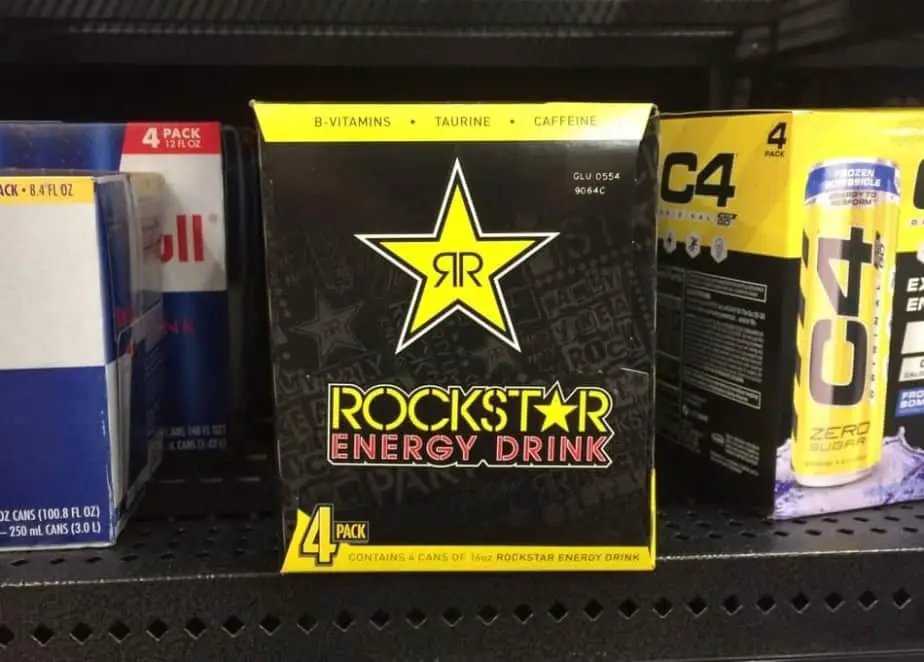Rockstar is a popular energy drink. It was created in 2001 so it’s been around a couple of decades now. Because it’s been around so long, a lot of vegans grew up drinking the stuff and want to know if they can continue to do so after switching to a 100% plant-based diet.
Is it vegan? Yes, Rockstar is considered vegan. Formulations vary, but most (including the original) are some combination of carbonated water, sugar, preservatives, B vitamins, caffeine, amino acids, and food coloring agents. None of which are of animal origin.
What we’ll do here is look at the various reasons Rockstar energy drink is considered vegan, along with an analysis of the ingredients.
Why Rockstar Is Generally Considered Vegan
To start with, ingredients (for the original) include:1
- Carbonated Water
- Sucrose, Glucose
- Citric Acid, Sodium Citrate
- Sorbic Acid and Benzoic Acid (Preservatives)
- Taurine, Caffeine, L-Carnitine
- Guarana Seed Extract, Panax Ginseng Root Extract, Milk Thistle Extract
- Caramel Color
- Natural and Artificial Flavors
- Glucuronolactone
- B Vitamins: Pantothenic Acid (Vitamin B5), Niacinamide (B3), Riboflavin ( B2) Pyridoxine Hydrochloride (B6), and Cyanocobalamin (B12)
- Inositol
Taurine and Carnitine in Processed Foods Are Vegan
This couldn’t have been said to be true in the past—at least, not for taurine. Like with vitamins, taurine used to be derived from natural sources including animal tissue, but with newer technology, nowadays it’s much cheaper to produce the compound synthetically.
Compounds like taurine and caffeine are used in drinks often referred to as “smart beverages”—drinks that are purported to be able to boost concentration and alertness.2
A lot of fancy-sounding compounds are used in such beverages, in supposedly just the right combination and amount, to boost cognitive performance, despite lack of research to support the claims.
The substances that are most commonly added to smart beverages in order to stimulate mental activity include “amino acids” like taurine, choline, phenylalanine, and L-cysteine.3
I use quotes because taurine is not actually an amino acid, though it’s often referred to as such. Rather, it’s an amino sulfonic acid.4
Most of these compounds are generally considered vegan, with the exception of l-cysteine—which, fortunately, isn’t listed in the ingredients for Rockstar.
I wouldn’t go so far as to say that all taurine is vegan, but the most common form of taurine used in supplements and energy drinks is chemically synthesized without animal-derived precursors and is thus suitable for vegans.5,6
Then we have carnitine. It’s not immediately obvious that carnitine would be vegan because to get it in the diet, you have to consume animal products.
However, while most if not all carnitine in the diet is found in animal foods, the kind used for supplements and food/drink fortification is produced via bacterial fermentation.7
Caramel Color Is Suitable for Vegans
This one is counterintuitive. Caramel the confection is almost always non-vegan, due to the presence of milk products.
Caramel is made by performing the Maillard browning reaction on simple sugars, and lactose is usually the sugar of choice. Nowadays, caramel-flavored snack food is often made with corn syrup and other plant-based substances, but real caramel is almost always milk-based.
Anyway, caramel color should not be confused with actual caramel.
To make caramel color, food manufacturers perform the same browning reaction on simple sugars other than lactose—usually, glucose or fructose in the form of molasses, invert sugar, malt syrup, etc. at which point they extract the resulting brown color for use in processed food products.8
The Presence of Sugar Does Not Render a Food Non-Vegan
Not by most standards, anyway. Especially prudent vegans sometimes like to avoid any foods made with processed sugar, because white sugar tends to be made with bone char to remove impurities.
But, most vegans don’t avoid food products made with processed sugar, and vegan organizations like PETA give the green light on white sugar and “accidentally vegan” that invariably contain processed sugar foods.9,10
Largely, because sugar can be processed with decolorizing agents other than bone char, such as activated charcoal, and it’s nigh impossible to track down the origin of sugar in every food product.
The B Vitamins in Rockstar Are Vegan
Vitamins used to be extracted from substances that naturally contained them in large amounts. Depending on the vitamin, it could be plants or animals.
Nowadays, some vitamins continue to be extracted from nature, but chemical and microbial synthesis are much more economically feasible.
Sometimes it’s more complicated. For example, vitamin D is made synthetically. However, it’s made from a precursor that’s extracted from lanolin, a fatty substance found in sheep oil.
But, most vitamins are made chemically without the use of animal-derived precursors. And if they’re not made synthetically, they’re produced microbially.
Energy drinks like Rockstar make heavy use of B vitamins which are pretty much always synthetic.
Niacin (B3) can be be made by a combination of chemical and microbial processes.11
Pyridoxine (B6) is made chemically or microbially.11,12
Then we have vitamin B12, which is only produced by microbial fermentation, so B12 in fortified beverages and food products is always considered vegan.11
Milk Thistle Is Plant-Based
Anytime the word “milk” is on the ingredients panel, it should be considered a red flag. But, there are some exceptions and milk thistle is one of them.
Milk thistle is a common name for Silybum marianum, which is a thorny plant that’s long been thought to be medicinal.13
Regardless of whether it lives up to its health claims, it is 100% plant-based and thus vegan.
That’s it for the vegan status of Rockstar. Thanks for reading.
You may also want to check out the following related articles:
References
- Rockstar Energy Drink, 16 Fl. Oz. https://www.walmart.com/ip/Rockstar-Energy-Drink-16-Fl-Oz/15754381
- Understanding Food: Principles and Preparation (Page 554). Amy Brown – Wadsworth Cengage Learning – 2011. ISBN-10: 0-538-73498-1
- Hollingsworth P. Redefining New Age. Food Technology 51(8):44–51, 1997.
- Taurine, Compound Summary. Pubchem. US National Library of Medicine. https://pubchem.ncbi.nlm.nih.gov/compound/Taurine
- What Is Taurine? Benefits, Side Effects, and More Rudy Mawer – https://www.healthline.com/nutrition/what-is-taurine
- Kosswig, K. (2000). “Sulfonic Acids, Aliphatic”. Ullmann’s Encyclopedia of Industrial Chemistry. Weinheim: Wiley-VCH. https://onlinelibrary.wiley.com/doi/abs/10.1002/14356007.a25_503
- Vicente Bernal, et al. Production of L-carnitine by secondary metabolism of bacteria. Microb Cell Fact. 2007; 6: 31. https://www.ncbi.nlm.nih.gov/pmc/articles/PMC2131755/
- Caramel Color. https://en.wikipedia.org/wiki/Caramel_color
- Is Sugar Vegan? https://www.peta.org/living/food/is-sugar-vegan/
- Accidentally Vegan Food and Snacks List. https://www.peta.org/living/food/accidentally-vegan/
- Jose L. Revuelta, Ruben M. Buey, Rodrigo Ledesma‐Amaro, and Erick J. Microbial biotechnology for the synthesis of (pro)vitamins, biopigments and antioxidants: challenges and opportunities. Microb Biotechnol. 2016 Sep; 9(5): 564–567. https://www.ncbi.nlm.nih.gov/pmc/articles/PMC4993173/
- Y. Tani. Microbial Production of Vitamin B6 and Derivatives. Biotechnology of Vitamins, Pigments and Growth Factors pp 221-230. https://link.springer.com/chapter/10.1007/978-94-009-1111-6_13
- Milk Thistle. https://en.wikipedia.org/wiki/Silybum_marianum


